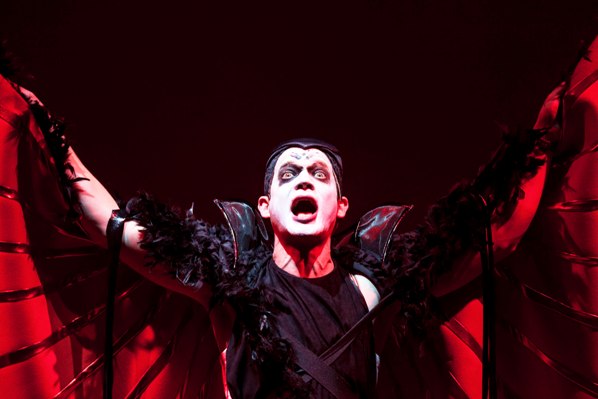
The relationship between truth and art has always been complicated, and that is not necessarily a bad thing. Our yearning for simplicity often leads to an utter disregard for the messy tangle of truth, in exchange for easy slogans: art is political/art is not political. The strict observation of the first risks boring didacticism, while a fervent belief in the second implies a severe case of denial; and it is wise to remember that even while one is deep in denial, life goes on.
All this to say that after watching Mephisto at the Cameri Theatre, I couldn’t sleep at all. It was that disturbing, and that good. It probably didn’t help that I tried to lull myself to sleep by reading Ursula Hegi’s Stones From the River until the wee hours of the night. The play, written by Hillel Mittelpunkt and directed by Omri Nitzan, is based on Klaus Mann’s novel Mephisto, published in 1936, while the writer was in exile. Given the novel’s theatrical theme, adaptation to the stage feels almost inevitable, and works wonderfully.
Mephisto centers on Hendrik Hofgan (Itay Tiran), a talented actor who only wishes to focus on his art, dreaming (as any actor would) of playing the great roles, and among them, especially, that of Mephisto in Goethe’s Faust. Yet how does one make the distinction between focus on one’s art, and a focus on self and self-promotion? One of the most quoted and most misunderstood lines in Shakespeare is the famous phrase: “to thine own self be true and then it must follow as the night the day thou canst not then be false to any man.” Many take this quote out of context to support following one’s own desires and whims wherever they may lead. Yet if one examines the context, William Shakespeare put those words in the mouth of Polonius, a pompous fool.
What does it mean to be true to one’s art? For Hofgan, this means bending to the sway of whoever is in power, in this case, the Nazis. In order to advance in the theatre and play the roles he desires, he adapts and takes on whatever role or persona the moment demands, finding rationalizations all along the slippery slope, lying to himself and others. After all, cooperating with the current regime is not necessarily a bad thing to do, he can be most effective at helping others from within.
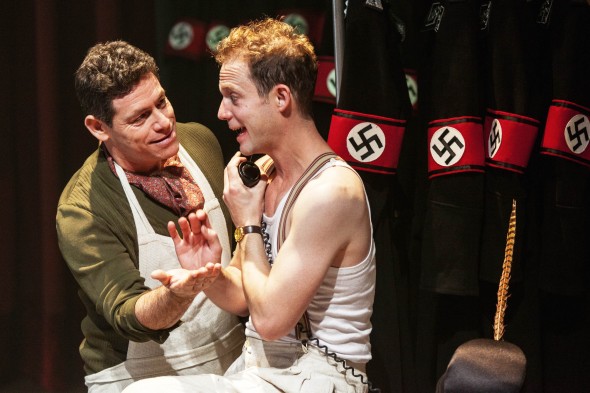
Although the theme is serious, the play is not grim at all, on the contrary. Directed by Omri Nitzan, it is full of vitality, with excellent music, movement and acting performances by the entire cast. The self-referential quality of the play – about the theatre, taking place in the theatre before an audience (we, the viewers) brings an additional dimension and frisson of recognition, sometimes comic and at times veering on the tragic. It is a play that takes place almost entirely backstage, where one is privy to the dramas of the actors when they take off their costumes, and shed the mask.
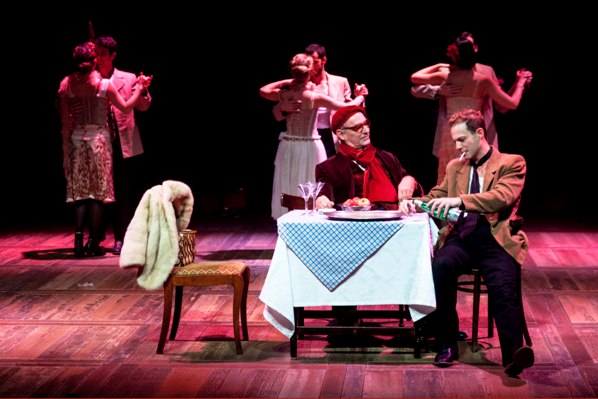
Itay Tiran does not invite one’s empathy in this role, as Hofgen, he’s rather the hero one loves to hate. There are a few small moments when he lets the ordinary human being shine through, reflecting on his humble past, or shamelessly confessing his superficiality to his bride to be Barbara, saying that she need not fear marriage as he is so self-absorbed she’ll feel as though she were still single.
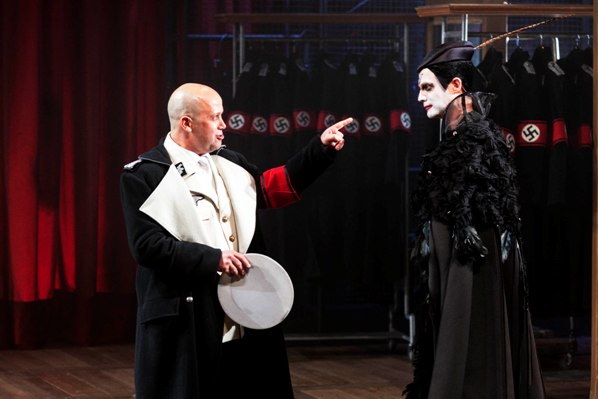
Mephisto examines the moral costs of success and stardom, and one of the great strengths of this play is that it is not a star vehicle, but rather an excellent ensemble piece. Irit Kaplan plays several roles and is at once hilarious and touching whether as Mutz, an actress in the local theatre, complaining that she is only cast in minor roles for the third year straight, or as an Actress in the Workers Theatre, who simply doesn’t get it. Dudu Niv is spectacularly sleazy as The General, the kind of man who makes you want to wash your hands after you shake hands with him. Eli Gornstein merges the comic and tragic so well in his many roles here, his sonorous voice and stage presence transforming chameleon like from the downtrodden theatre manager Oscar Krug, to the formal Bruckner, the arrogant, pedantic Reinhardt.
Yet it is in his role as Keiser von Munk, the small mind that comes to wield great power, that he offers one of the play’s most comic and chilling moments. Visiting the theatre as a representative of the new order, he informs them that foreign writers like Chekov will no longer be tolerated on the German stage, the theatre must be imbued with a love and allegiance to the nation. The government will decide what is appropriate for the theatre, and what is not. Somehow, when you hear the words spoken like that onstage, it all sounds so wrong…
Mephisto is a powerful play about power, politics and art; and it just might keep you up all night thinking about it.
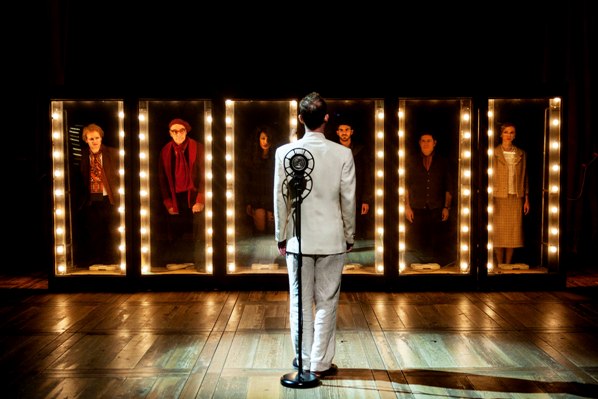
Mephisto
By Klaus Mann; Play by Hillel Mittelpunkt; Directed by Omri Nitzan; Set: Roni Toren; Costumes: Polina Adamov; Lighting: Keren Granek; Music Direction: Dori Parnes; Choreography: Tal Cohn; Stage Fights: Gnady Babitzki; Gil Weinberg; Assistant Director: Efrat Lipshitz; Cast: Hendrik Hofgan – Itay Tiran, Lotte Leidental/Bella/Mutz/Actress of Worker’s Theater – Irit Kaplan; The General – Dudu Niv; Oscar Krug/Bruckner/Reinhardt/Keiser von Munk – Eli Gornstein; Juliette – Ruth Asrsai; Nicolleta – Helena Yaralova; Beck – Simcha Barbiro; Hans Miklas – Gil Weinberg; Barbara – Anastasia Fein; Otto Ulrich – Avishai Meridor; Bonetti – Asaf Maron; Yoachim – Adam Sheffer; Secretary – Lina Anna Castrup; Dora Martin – Shely Ben Joseph; Maria – Roni Sheindorf





